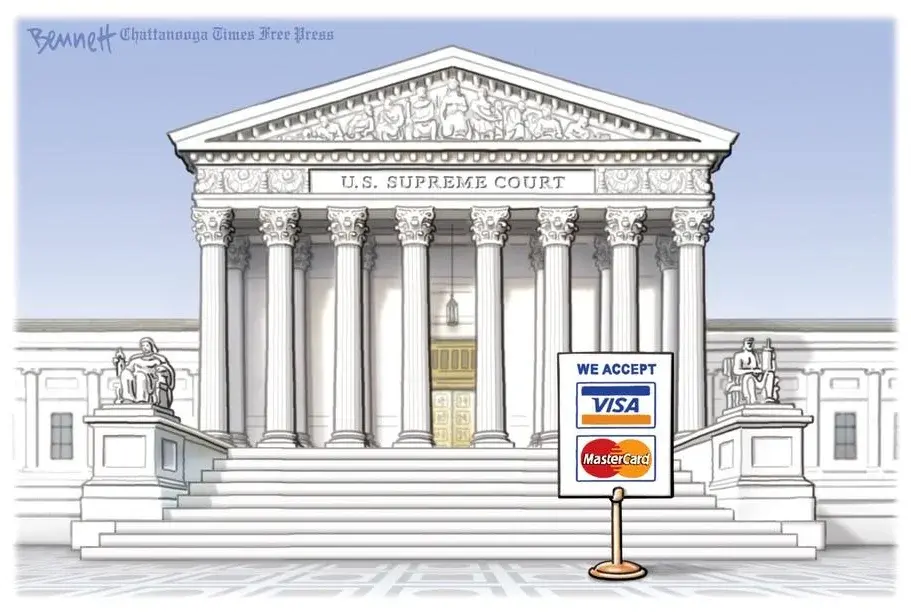A Democracy— If You Can Afford It… Another Supreme Court Sellout To Big Money
- Howie Klein

- Jul 2, 2025
- 4 min read
Roberts & The Billionaires’ Bench Prepare To Finish Off Campaign Finance Reform

The most extreme and corrupt Supreme Court since Roger Taney’s (1836-1864) may be about the strike another blow against the America democracy it despises. Get ready for another bodyblow against campaign finance reform. In the past these right wing Supremes have gleefully dismantled commonsense guardrails like McCain-Feingold and opened the floodgates to dark money through Citizens United and McCutcheon. Now, with billionaires whispering in their ears and Leonard Leo’s fingerprints all over the bench, they’re preparing to gut what little remains of our ability to limit the corrosive power of corporate cash. This is shaping up to be more like than a corporate hostile takeover than a legitimate argument over judicial philosophy.
On Monday, Abbie VanSickle reported that the Supremes “agreed to hear a major challenge to longstanding limits on how much political parties can spend in coordination with federal candidates. Such limits on coordinated spending were established under a 1974 law enacted in the wake of the Watergate scandal and restrict party committees from coordinating with a candidate to spend money on campaign advertising. In November 2022, Vice President JD Vance, who was then an Ohio senator, and Steve Chabot, an Ohio congressman at the time, sued arguing that the limits violated the First Amendment. They were joined by the National Republican Senatorial Committee and the National Republican Congressional Committee.”
The NRCC asked the Court to take the case, which “could dramatically reshape how campaigns are funded and the relationship between the parties and their candidates for office.”
The challengers pointed to a decision by the U.S. Court of Appeals for the Sixth Circuit, which had rejected the suit, citing a 2001 decision by the Supreme Court, Federal Election Commission v Colorado Republican Federal Campaign Committee, that found that limits on coordinated spending were justified. Without such limits, the majority reasoned, wealthy donors could circumvent limits on contributions to individual candidates by simply routing money to political parties instead.
In the decision, Chief Justice Jeffrey Sutton wrote that the appeals court would uphold the limits based on the 2001 Supreme Court case, but agreed that “coordinated party expenditure limits” stood in tension with recent First Amendment doctrine.
That landmark 2001 decision stemmed from a dispute between the Federal Election Commission and the Colorado Republican Party, which argued that limits on coordinated spending infringed on its right to unfettered political speech.
Under the Trump administration, the election commission has sided with the challengers, filing a brief to say that it agrees that such restrictions violate the First Amendment.
The Democratic National Committee, which filed a motion to intervene in the case, has indicated it will defend the campaign finance restrictions before the court.
“The Republican Party has spent decades trying to eliminate statutory limits on political party expenditures that are coordinated with candidates’ campaigns,” lawyers for the DNC wrote in a brief to the court.
According to the Federal Election Commission, the current limits, which vary depending on each state’s voting age population, can be as much as $3.9 million for Senate candidates and as much as $127,200 for House candidates in states with only one representative. For House candidates in other states, the limit is $63,600.

As I’m sure you’re well aware, this is no aberration. The conservative movement has been at war with campaign finance reform for over half a century— because they know that when money dominates politics, their billionaire patrons win and everyone else loses. From Buckley v. Valeo to Citizens United to whatever monstrosity the Court is now preparing to unleash, the throughline is crystal clear: the right wants to drown democracy in a bathtub of cash. Every time reformers have tried to level the playing field— to make politics less of an auction and more of a debate— the right has rushed in, screaming “free speech” while stuffing sacks of donor money into every crack in the system.
Obviously, this has never been about free speech. It’s about whose speech gets heard. When money equals speech, the working class is rendered mute, and democracy becomes a luxury item reserved for the ultra-wealthy. A system this awash in money doesn’t just tilt the playing field. It erodes public trust, depresses civic participation and ensures that public policy increasingly serves the donor class instead of the public good. The MAGA Roberts Court has worked methodically to convert representative government into a private-members club for the rich. And when they gut these coordinated spending limits, they’ll be cutting out one of the last guardrails protecting the public interest from total oligarchic capture. This is about power and the justices are well aware of how they got appointed to the Court.
Yesterday I talked with Wisconsin congressional candidate Randy Bryce, a courageous progressive Democrat, about this case. “It’s already hard enough to run for office as a working person— especially if you follow the rules. This new twist will basically allow every superPAC to work with a campaign. Literally untraceable dark money as a feature. We need to stop this.” Please consider contributing to Randy’s grassroots campaign here.







Under the direction of John Roberts and Donald Trump, the Supreme Court has failed the Constitution and the voters. They did it for rubles and dollars.